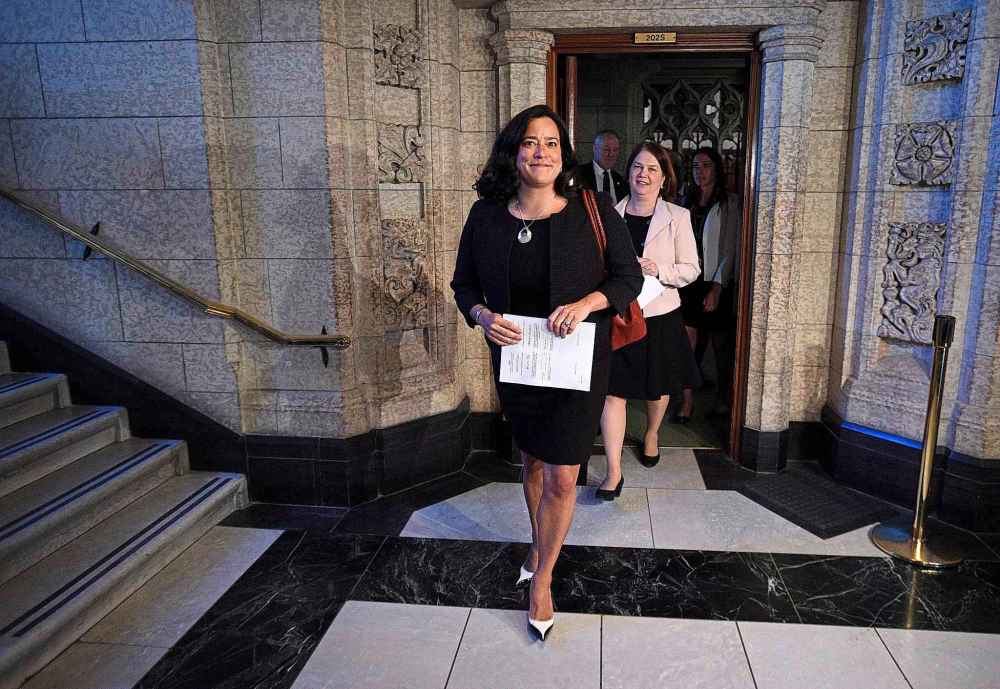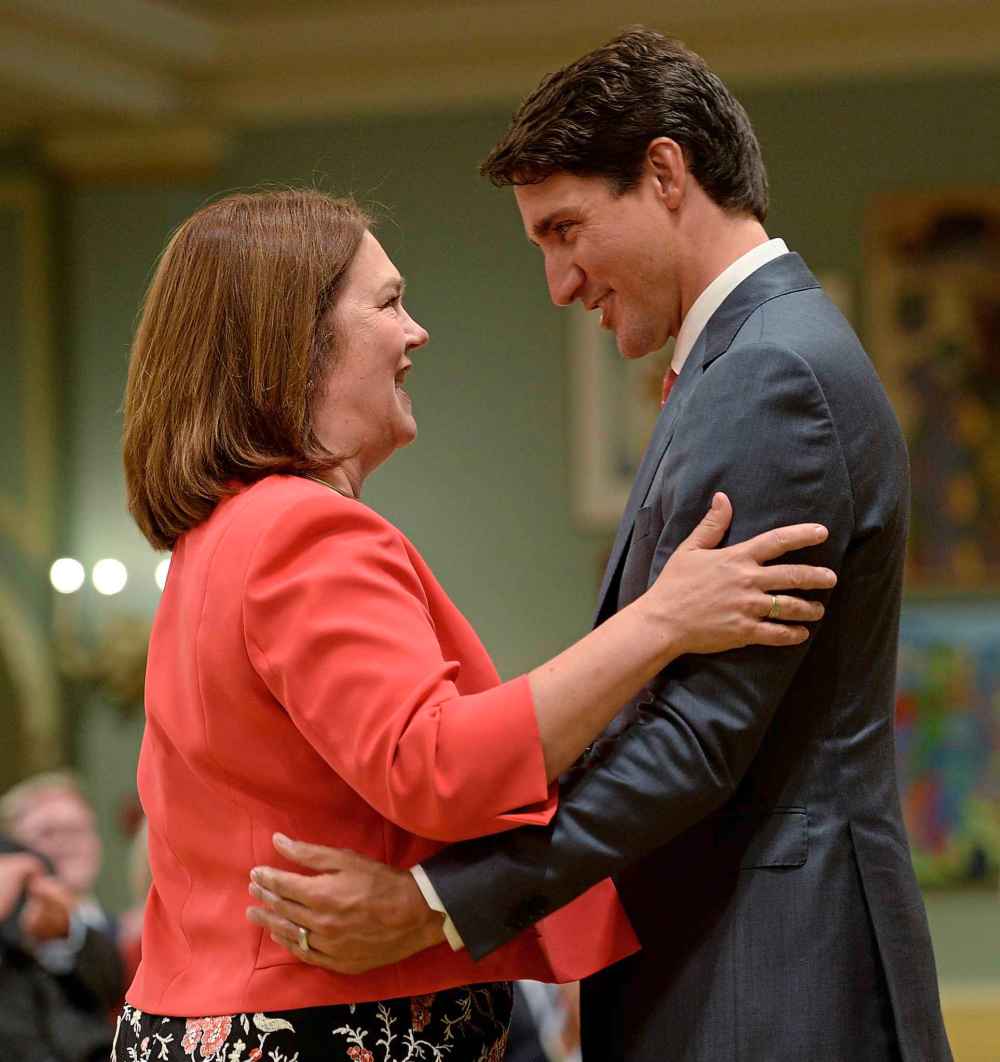Strong, capable women rob Trudeau of moral authority
Read this article for free:
or
Already have an account? Log in here »
To continue reading, please subscribe:
Monthly Digital Subscription
$0 for the first 4 weeks*
- Enjoy unlimited reading on winnipegfreepress.com
- Read the E-Edition, our digital replica newspaper
- Access News Break, our award-winning app
- Play interactive puzzles
*No charge for 4 weeks then price increases to the regular rate of $19.00 plus GST every four weeks. Offer available to new and qualified returning subscribers only. Cancel any time.
Monthly Digital Subscription
$4.75/week*
- Enjoy unlimited reading on winnipegfreepress.com
- Read the E-Edition, our digital replica newspaper
- Access News Break, our award-winning app
- Play interactive puzzles
*Billed as $19 plus GST every four weeks. Cancel any time.
To continue reading, please subscribe:
Add Free Press access to your Brandon Sun subscription for only an additional
$1 for the first 4 weeks*
*Your next subscription payment will increase by $1.00 and you will be charged $16.99 plus GST for four weeks. After four weeks, your payment will increase to $23.99 plus GST every four weeks.
Read unlimited articles for free today:
or
Already have an account? Log in here »
Hey there, time traveller!
This article was published 05/03/2019 (2469 days ago), so information in it may no longer be current.
The hole that Prime Minister Justin Trudeau fell into last week just got a little deeper, and his path back out significantly less certain.
Following an extraordinary week in which former Justice Minister Jody Wilson-Raybould publicly accused Trudeau and his senior staff of improper political pressure to help SNC-Lavalin, Treasury Board President Jane Philpott resigned from cabinet, saying she had lost confidence in the prime minister and cabinet.
It was always going to be a challenge for Trudeau to survive the damage done by Wilson-Raybould following her resignation from cabinet, and testimony to a Commons committee last week. But Philpott’s resignation has made that climb seem nearly unassailable.

At press time, Trudeau is reportedly hunkered down in his Ottawa office, contemplating some sort of statement of contrition. That’s solid evidence that this latest development has pushed Trudeau’s leadership to the brink of the abyss.
Cast as a modern man with modern sensibilities, Trudeau suddenly finds himself in conflict with two of the most accomplished, most respected women in his cabinet. Women who were recruited and promoted by Trudeau as evidence not only of his party’s ability to attract the best and brightest, but of his own interest in seeing as many strong women as possible in positions of real power.
Instead, Trudeau’s predicament illustrates that it’s not enough for powerful men to invite women to join them as leaders – they must also be prepared to change the way in which they lead.
Where does that leave Trudeau and his wounded Liberal government? One more high-profile defection from cabinet and Trudeau may find himself the subject of a debate among Grits about whether he needs to step aside in a last-ditch effort to save his party.
However, we’re not there yet. Not quite.
Before we can have an appropriate debate about Trudeau’s next move, we really need to know more about the SNC-Lavalin case itself. Not the internal campaign to convince Wilson-Raybould to overrule her director of public prosecutions, but about whether the decision to deny the company a deferred prosecution agreement was fair and just within the context of the law.
Many Canadians will not care about whether SNC-Lavalin deserves a deferred prosecution — a legal proceeding to allow the firm to submit to fines and penalties to avoid criminal conviction — or whether the federal prosecutor handling the case was correct in denying them that option. Public opinion polls show quite clearly that a good many Canadians have seen and heard the broad strokes of this scandal, and have already made up their minds.
More than half of respondents to a Nanos poll believe that SNC-Lavalin should be subject to criminal prosecution. One in four respondents to the same poll said this scandal will influence their votes in the fall election. Those numbers represent seismic shifts in public opinion that will be difficult to reverse. In fact, Trudeau’s only hope is that his own government loses a federal court challenge by SNC-Lavalin.

SNC-Lavalin has asked the federal court to review the decision to deny it a deferred prosecution (DPA) under the terms of an amendment to the Criminal Code that Trudeau government introduced in part to respond to the SNC-Lavalin case.
Early filings from that case indicate that SNC-Lavalin will argue that the director of prosecutions never explained why a DPA was inappropriate in this case. It also argues that federal prosecutors ignored elements of the law which, at first blush, seem to fit the dilemma being faced by SNC-Lavalin right now.
The federal government has not been robust in its response. However, it certainly establishes that SNC-Lavalin has a viable argument to make in federal court, and that the justice department has some explaining to do. The final outcome of this hearing may determine whether Trudeau was correct in asking Wilson-Raybould to reconsider her prosecutor’s decision. Or whether it was, as she portrayed it, inappropriate pressure.
Here’s the rub: even if the federal court rules in SNC-Lavalin’s favour, it may be impossible for Canadians to forgive Trudeau for pressuring, and then demoting, Wilson-Raybould.
Trudeau and some of his senior-most staff — including former chief of staff Gerald Butts, scheduled to testify to the commons justice committee on Wednesday — have veered dangerously close to dismissing Wilson-Raybould as a politician of limited experience who clearly did not understand the way the political world works.
History will show that Trudeau and his people tried to get Wilson-Raybould to see the issue in a different light. Then they tried to get her to go outside government for another legal opinion. Then, finally, they tried to either threaten her or trigger her guilt by discussing the political fallout of not helping SNC-Lavalin.
And then, when all else failed, he simply shuffled her out of the justice portfolio. That may turn out to be the worst decision of all.
At some point in the SNC-Lavalin narrative, Trudeau decided that demoting Wilson-Raybould and sacrificing her on the altar of traditional politics was less problematic than abandoning a prominent Quebec company’s bid to avoid criminal prosecution. That was a miscalculation that Philpott has further underlined.

A lot of men and women who came before Wilson-Raybould, and who found themselves on the wrong side of a prime minister, took their punishment quietly. Wilson-Raybould did not, and that as much as anything signifies that recruiting strong and capable women outside politics into the political arena is changing the rules of the game.
There is some chance that a federal court may rule that SNC-Lavalin did deserve a DPA, or that the justice department did not treat the company fairly. However, that may prove to be little more than a moral victory for a prime minister that Canadians believe has already lost the moral authority to govern.
dan.lett@freepress.mb.ca

Born and raised in and around Toronto, Dan Lett came to Winnipeg in 1986, less than a year out of journalism school with a lifelong dream to be a newspaper reporter.
Our newsroom depends on a growing audience of readers to power our journalism. If you are not a paid reader, please consider becoming a subscriber.
Our newsroom depends on its audience of readers to power our journalism. Thank you for your support.
History
Updated on Wednesday, March 6, 2019 9:45 AM CST: Corrects typo
Updated on Wednesday, March 6, 2019 10:37 AM CST: corrects typo
















